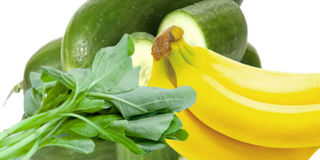Healthy ways to quench your thirst

Cucumbers, bananasis and spinach are super hydrats. PHOTO/NET
Thirst is basically the urge or desire to drink water. It is the body’s way of letting you know that it is has run out of water and needs to be rehydrated. When the body experiences excessive loss of water it becomes dehydrated. Dehydration, according to Dr Edward Mugisha is a condition where one lacks water in the body due to losses as a result of an illness, excessive sweating or poor water intake.
“Your body responds to a concentration of sodium in your blood by sending thirst signals to your brain. Since we lose water and retain salt when we sweat, we need to take water in order to regain an optimum balance,” says Dr Mugisha.
Julius Lwanga, a nutritionist from Kampala Hospital, suggests listening to our bodies for cues as to how much water we should consume. Water intake varies according to age and health condition; but healthy adults are advised to drink about two and a half litres of water a day. It can be drunk in form of plain water, tea, fruit juice and even some foods among others.
“As the saying goes, too much of anything is bad and consuming too much water is no exception. When we drink too much water, we risk diluting the sodium level in the blood which causes effects such as nausea, vomiting, headaches and even seizures,” says Lwanga.
Quenching thirst
Since your body is composed of about 75 percent water, it needs proper hydration to enable its functions such as digestion, absorption, circulation, creation of saliva, transportation of nutrients, and maintenance of body temperature. Drinking more water is a good place to start. Consuming hydrating foods is also another thirst quenching remedy. A number of foods have been identified for their rehydrating properties. These include:
Watermelon
Research from the University of Aberdeen identified watermelon as the superstar hydrating fruit. As suggested by the name, watermelon contains 92 percent water, along with eight percent sugar and a variety of mineral salts that are essential for optimum hydration, including sodium, magnesium and potassium.
Cucumbers
At 96 percent water content, cucumbers have the highest water content of any solid food. Eating a cucumber can, according to the University of Aberdeen study, deliver hydration levels twice the volume of water, thanks to the mineral salts and sugars, which mimic the body’s natural electrolyte balance.
Bananas
Eating potassium-rich foods such as bananas can quench your thirst. Bananas also contain 74 percent water which should restore water balance in the blood.
Strawberries
All berries are good foods for hydration but strawberries with their 92 percent water content have the highest water content of all the berries, making them a better choice.
Spinach
At 92 percent water content, spinach is a useful hydrating food. Other foods include radishes which have 95 percent water, tomatoes at 94 percent water and grapefruit among others.




